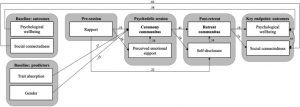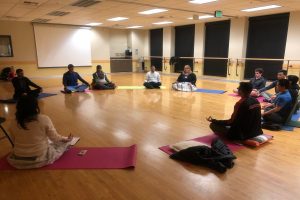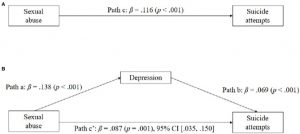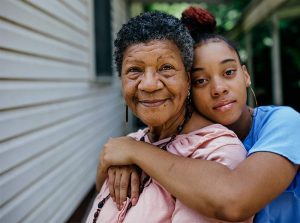Improve Somatic Symptom Disorder with Mindfulness
By John M. de Castro, Ph.D.
“Somatic symptom disorder . . . symptoms cannot be explained by general medical conditions and significantly affect one’s functioning.” – S. Actas
According to the American Psychological Association “Somatic symptom disorder involves a person having a significant focus on physical symptoms, such as pain, weakness or shortness of breath, that results in major distress and/or problems functioning. The individual has excessive thoughts, feelings and behaviors relating to the physical symptoms.” Somatic Symptom Disorder occurs in about 5% to 7% of the population, effect people of all ages and is more common in women. It is associated with poor health, problems functioning in daily life, including physical disability, problems with relationships, problems at work or unemployment, other mental health disorders, such as anxiety, depression and personality disorders, increased suicide risk related to depression, and financial problems due to excessive health care visits. Obviously, this produces major suffering in the patients. But little is known of the causes or treatment of Somatic Symptom Disorder.
Somatic Symptom Disorder is frequently treated with antipsychotic and antidepressant drugs with limited success. It often co-occurs with anxiety and depression. Since, mindfulness training has been shown to be effective in treating anxiety, depression, and somatization, it makes sense to investigate the effectiveness of mindfulness-based therapies for the treatment of Somatic Symptom Disorder.
In today’s Research News article “Effect of Mindfulness-Based Stress Reduction Program on Psychological Symptoms, Quality of Life, and Symptom Severity in Patients with Somatic Symptom Disorder.” (See summary below or view the full text of the study at: https://www.ncbi.nlm.nih.gov/pmc/articles/PMC8095256/ ) Zargar and colleagues recruited patients with Somatic Symptom Disorder who were on continuing treatment with the antidepressant drug, venlafaxine, and randomly assigned them to either 8 weeks of once a week treatment for 2 hours of Mindfulness-Based Stress Reduction (MBSR) or no further treatment. They were measured before and after treatment for Somatic Symptom Disorder symptom severity, including anxiety, depression, and stress, health-related quality of life, and patient health.
They found that in comparison to baseline and the control group, the group that received Mindfulness-Based Stress Reduction (MBSR) had significantly lower levels of Somatic Symptom Disorder symptom severity, including significantly lower levels of anxiety, depression, and stress and significant reductions in physical symptoms and increases in physical health. Hence, MBSR treatment significantly improved not only the psychological symptoms but also the physical symptoms of Somatic Symptom Disorder.
Mindfulness-Based Stress Reduction (MBSR) is a mindfulness training program that includes training and practice in meditation, body scan, and yoga and includes group discussion. The results demonstrate that MBSR is an effective treatment in addition to antidepressant drugs for Somatic Symptom Disorder. But since there wasn’t any follow-up data obtained it is not known how lasting is the symptom relief. It will be interesting in the future to examine if MBSR is effective as a stand-alone treatment and if its effects persist after the cessation of treatment.
So, improve Somatic Symptom Disorder with mindfulness.
“mindfulness-based cognitive therapy that can be useful in the treatment of somatic disorders.” – Recovery Village
CMCS – Center for Mindfulness and Contemplative Studies
This and other Contemplative Studies posts are also available on Google+ https://plus.google.com/106784388191201299496/posts and on Twitter @MindfulResearch
Study Summary
Zargar, F., Rahafrouz, L., & Tarrahi, M. J. (2021). Effect of Mindfulness-Based Stress Reduction Program on Psychological Symptoms, Quality of Life, and Symptom Severity in Patients with Somatic Symptom Disorder. Advanced biomedical research, 10, 9. https://doi.org/10.4103/abr.abr_111_19
Abstract
Background:
Patients with somatic symptom disorder (SSD) had a poor quality of life and suffered from depression, anxiety, and stress. Mindfulness-based stress reduction (MBSR) is a psychological treatment with remarkable effects on several psychological disorders. This study aimed to evaluate the effect of the MBSR program on psychological symptoms, quality of life, and symptom severity in patients with SSD.
Materials and Methods:
The patients with SSD were randomly divided into two groups of receiving venlafaxine alone and venlafaxine with an 8-week MBSR program. Depression, anxiety, and stress with their severities were assessed along with the quality of life, the number of physical symptoms and their severities, as well as SSD severity before and after the intervention. Subsequently, the results were compared between the two groups.
Results:
This study included 37 patients with SSD who referred to Shariati Psychosomatic Clinic, Isfahan, Iran, with a mean age of 37.08 ± 8.26 years. It should be noted that 37.8% of the participants were male. The intervention group obtained significantly lower scores in depression, anxiety, stress, and their severities, compared to the control group. Moreover, the number of physical symptoms, their severity, and the severity of SSD were significantly decreased more in the intervention group rather than the controls.
Conclusion:
The MBSR accompanied by prescribing venlafaxine can significantly reduce the severity of SSD, as well as the number and severity of physical symptoms. Moreover, it can reduce depression, anxiety, stress, and their severity. The MBSR can be used as complementary medicine for the treatment of patients with SSD.
https://www.ncbi.nlm.nih.gov/pmc/articles/PMC8095256/








